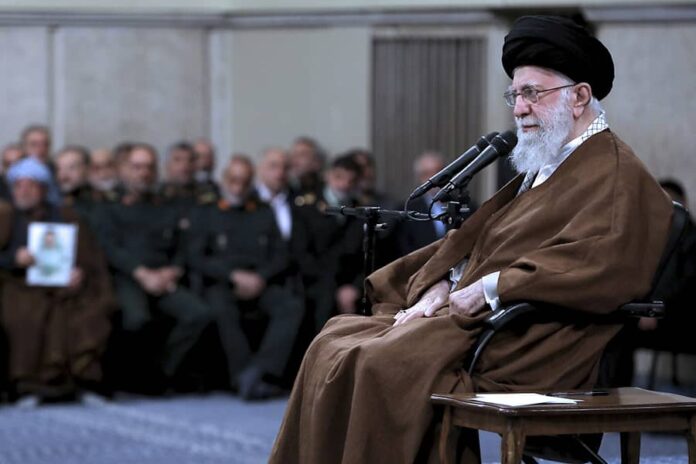On Saturday, Iran’s supreme leader issued a stern warning to both Israel and the U.S., promising a strong retaliation for their attacks on Iran and its allies.
Ayatollah Ali Khamenei made these comments as Iranian officials ramp up their threats of another strike against Israel, following an attack on October 26 that targeted military sites in Iran and resulted in at least five fatalities.
With tensions already high due to the ongoing Israel-Hamas conflict in Gaza and Israel’s ground operations in Lebanon, any new hostilities could potentially spark a larger regional war, especially with the U.S. presidential election looming this Tuesday.
Khamenei stated in a video shared by state media that both the Zionist regime and the U.S. will face serious consequences for their actions against Iran and its allies.
However, he didn’t specify when or how this response would take place. It’s worth noting that U.S. military personnel are stationed at various bases across the Middle East, including some who are currently operating a THAAD missile defense system in Israel.
It seems like the USS Abraham Lincoln aircraft carrier is currently stationed in the Arabian Sea. Meanwhile, Pentagon press secretary Maj. Gen. Pat Ryder mentioned on Friday that they’re sending more destroyers, fighter squadrons, tankers, and B-52 long-range bombers to the area to keep Iran and its militant allies in check. Khamenei, who is 85 years old, had previously taken a more measured stance, suggesting that Iranian officials would carefully consider how to respond and that they shouldn’t overreact or downplay Israel’s attacks.
Iran has directly attacked Israel twice this year once in April and again in October. However, their attempts to minimize the impact of Israel’s strikes hit a snag when satellite images analyzed by The Associated Press revealed damage at military sites near Tehran related to its ballistic missile program, as well as at a Revolutionary Guard base used for satellite launches. Iran’s allies collectively referred to as the Axis of Resistance have also suffered significant losses due to ongoing Israeli assaults, especially Hezbollah in Lebanon and Hamas in Gaza. Iran has traditionally relied on these groups for asymmetric warfare against Israel while also using them as a buffer against direct attacks.
Some experts think these groups are pushing Iran for more military support. However, Iran itself is grappling with serious internal challenges; its economy is struggling under heavy international sanctions and it has been facing years of widespread protests. After Khamenei spoke out recently, the value of the Iranian rial plummeted to 691,500 against the dollar close to an all-time low compared to 32,000 rials per dollar back when Tehran struck its nuclear deal with world powers back in 2015.
Just before Khamenei made his comments public, Gen. Mohammad Ali Naini a spokesperson for Iran’s paramilitary Revolutionary Guard that oversees ballistic missiles capable of hitting Israel gave an interview with Fars news agency where he stated that Iran’s response would be wise and powerful beyond what their enemies could anticipate.
The leaders of the Zionist regime really need to take a good look out of their bedroom windows and keep an eye on their pilots, who are operating in such a limited area, he cautioned.
It seems that Israeli air force pilots used air-launched ballistic missiles during the attack on October 26. On Saturday, Khamenei met with university students to observe Students Day, which remembers the tragic events of November 4, 1978. Back then, Iranian soldiers opened fire on students protesting against the shah at Tehran University, resulting in several casualties and heightening tensions that eventually led to the shah’s departure and the Islamic Revolution in 1979. The crowd was enthusiastic in their reception of Khamenei, chanting: The blood in our veins is a gift to our leader! Some even made a hand gesture reminiscent of one made by the late Hezbollah leader Hassan Nasrallah back in 2020 when he warned that American troops arriving in the Middle East would end up being sent home horizontally—in coffins.
This Sunday marks 45 years since the U.S. Embassy hostage crisis began according to the Persian calendar. The storming of the embassy by Islamist students on November 4, 1979, triggered a gripping 444-day standoff that solidified decades of hostility between Tehran and Washington—a tension that remains unresolved today.

